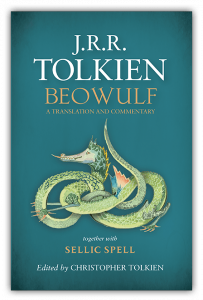 The long-awaited Tolkien translation of Beowulf is out now. So, if you haven’t pre-ordered, you should be able to wander into your favourite bookstore and grab yourself a copy (or just head to Amazon.
The long-awaited Tolkien translation of Beowulf is out now. So, if you haven’t pre-ordered, you should be able to wander into your favourite bookstore and grab yourself a copy (or just head to Amazon.
Edited by Christopher Tolkien, Beowulf includes the translation in prose plus an illuminating commentary, based on a series of lectures given by J.R.R. Tolkien at Oxford in the 1930s.
Chris Tolkien describes the work:
Through Tolkien’s clarity of vision, it is as if you entered into the imagined past: standing beside Beowulf and his men shaking out their mail-shirts as they beached their ship on the coast of Denmark, listening to the rising anger of Beowulf at the taunting of Unferth, or looking up in amazement at Grendel’s terrible hand set under the roof of Heorot.
The commentary in this book includes also much from those lectures in which, while always anchored in the text, he expressed his wider perceptions. He looks closely at the dragon that would slay Beowulf “snuffling in baffled rage and injured greed when he discovers the theft of the cup”; but he rebuts the notion that this is “a mere treasure story”, “just another dragon tale”. He turns to the lines that tell of the burying of the golden things long ago, and observes that it is “the feeling for the treasure itself, this sad history” that raises it to another level.
“The whole thing is sombre, tragic, sinister, curiously real. The ‘treasure’ is not just some lucky wealth that will enable the finder to have a good time, or marry the princess. It is laden with history, leading back into the dark heathen ages beyond the memory of song, but not beyond the reach of imagination.”
This edition also includes Sellic Spell, a ‘marvellous tale’, a story written by Tolkien suggesting what might have been the form and style of an Old English folk-tale of Beowulf, in which there was no association with the ‘historical legends’ of the Northern kingdoms.
Beowulf is now available in hardback and as a deluxe slipcased edition.


